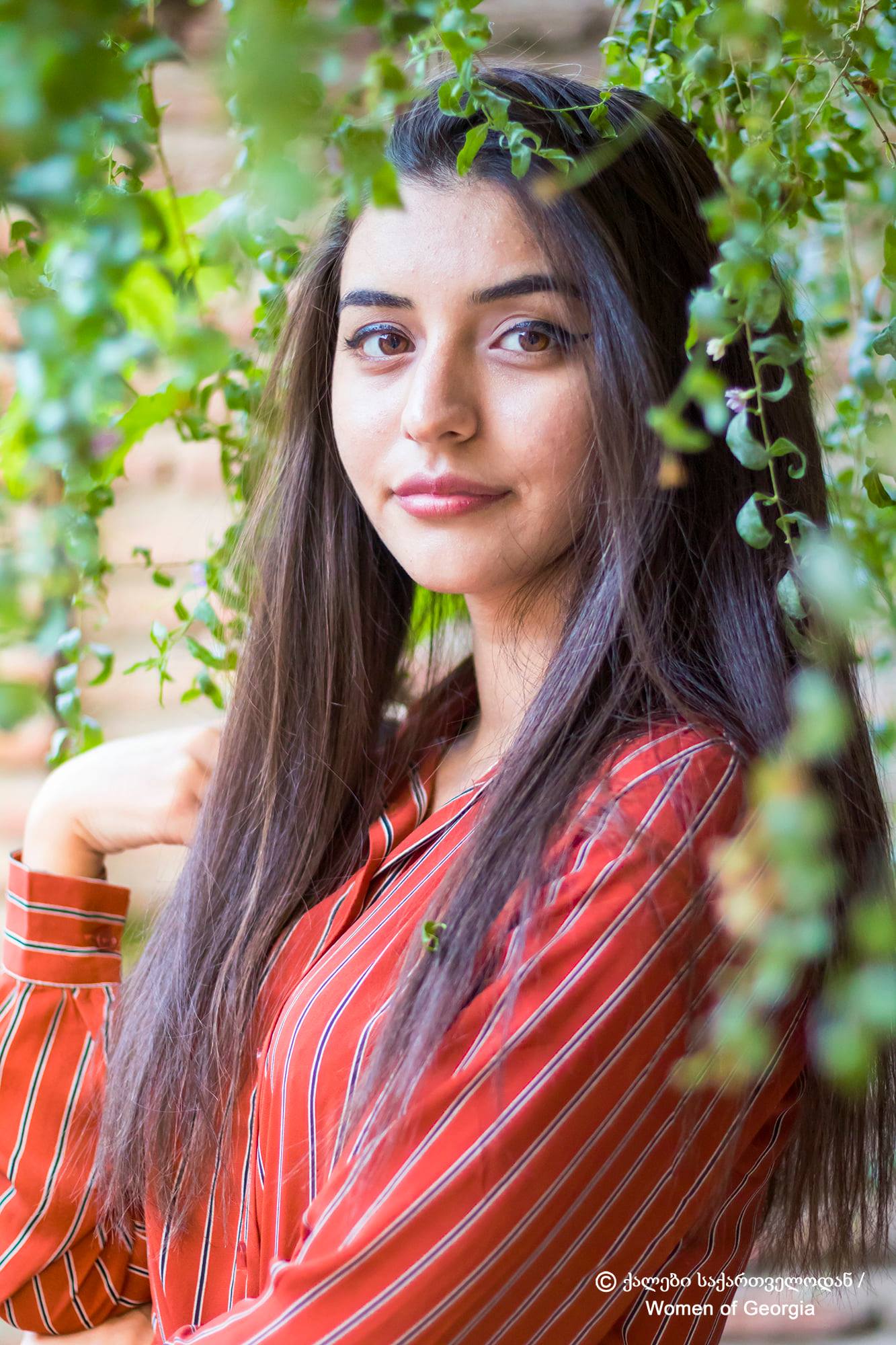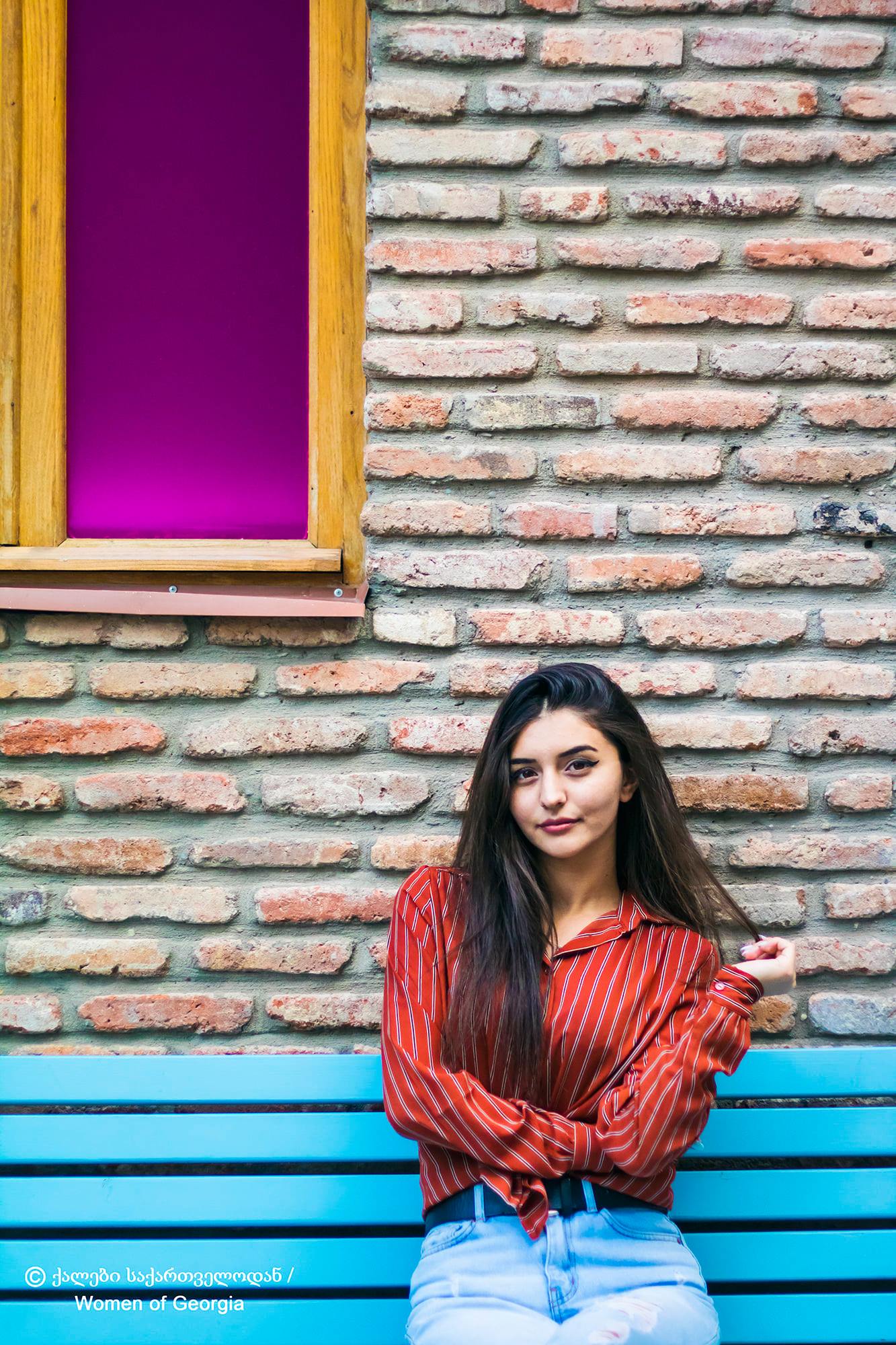October 16, 2020 In Ethnic minorities, Q-T, Qvemo Qartli, Regions, Themes
Sema Gasanova, 19 years old, municipality of Marneuli
“We were in 4th grade when a new Georgian language teacher – Manana Tsomaia started working in our school. Before that, I wasn’t motivated enough to learn the Georgian language or any other subjects at school. This teacher was very kind, friendly, and at the same time, a deeply intelligent person – she could talk about topics that both boys and girls were interested in. I was fascinated with her lessons and thought I should be kind and smart like her. Teacher Manana changed my life since after listening to her I learned Georgian and in general, I became a more active person; I started going to various training. After I got to know her, I changed my attitude toward Georgians as well – Teacher Manana was the model of Georgians, and I thought to myself what a great people they are.
My parents always thought differently. They said that a girl shouldn’t sit at home; instead, she has to study. Once, when I won a competition at school and took a medal home, my father told me, that I had to leave to study, that there was no place for me in the village. My father knew I wanted to study and he did everything for it. At the same time, my grandparents were also teachers, and they too were saying – what would they tell others if they themselves didn’t let their grandchild study?! But when I was choosing a profession, I still had trouble at home – I participated in a training organized by GIPA, where we were asked to direct a movie. I made this movie about my Georgian teacher and I won the award – a 4-year GIPA study grant, and if I studied there, I could study in the Bachelor of Journalism program for free. I wanted to be a journalist very much and this award was very important for me, but my parents were against it. They didn’t take journalism seriously and also, they thought if I’d get married in three or four years, my husband could prohibit me from being a journalist. Every woman in our community is either a teacher, or a doctor and my parents recommended these professions to me as well.
 I wanted to study at Iliauni or TSU, but I didn’t get enough points and instead went to Georgian Technical University. I was very nervous about it and decided to try again next year and get accepted to the place that I really wanted. I moved to Tbilisi to prepare for the exams, and, at the same time, started working in one of the supermarkets. Working there was very difficult since sometimes I had to work night shifts as well. Within a month, Ramilia Aliyeva from the Public TV Channel called me, she knew that I wanted to be a journalist and also, that I had experience working for Marneuli radio. I was called for an interview, and, as it turned out, they liked my Azerbaijani diction and I got the job on the same day. In a month, I was already hosting the show.
I wanted to study at Iliauni or TSU, but I didn’t get enough points and instead went to Georgian Technical University. I was very nervous about it and decided to try again next year and get accepted to the place that I really wanted. I moved to Tbilisi to prepare for the exams, and, at the same time, started working in one of the supermarkets. Working there was very difficult since sometimes I had to work night shifts as well. Within a month, Ramilia Aliyeva from the Public TV Channel called me, she knew that I wanted to be a journalist and also, that I had experience working for Marneuli radio. I was called for an interview, and, as it turned out, they liked my Azerbaijani diction and I got the job on the same day. In a month, I was already hosting the show.I worked in television for 8 months, and in addition to the show, I was also a news anchor. Being on TV wasn’t a problem for my parents – for them being a host on TV was safe and they were proud of it. They also saw how I really like journalism and that I was good at it, but they always had a problem when I had to go to any village alone to prepare the story for the show. There’s a belief in our community that a girl shouldn’t walk alone on village streets and my parents were worried that my reputation would be damaged because of that. After there was violence against Jeihun, my mother, grandmother and father called me again – this is journalism and we don’t want you to become one of them – they said. I’m in a very bad situation right now and I’m thinking about what to do. I’m already a student at a preparation course at Ilia State University. I wanted to learn the Georgian language first and then continue my studies at GIPA at the faculty of Journalism. If you’re a journalist, you have to go anywhere you have to; and, because I’m a girl, they see the danger in my journalism. For example, this year I was shooting in Bolnisi and they asked me everything – where I was going, to what kind of people, what kind of family they were, etc. If I were a boy, they wouldn’t have such an attitude.
Working on TV was a great experience for me. I worked with ethnic Georgians, Azerbaijanis, Armenians, and after that, I became a much tolerant person. However, these 8 months wasn’t easy, because I had a low score in quantitative and verbal reasoning and to prepare under a teacher I went to Marneuli every day to retake the exams and get the place in Iliauni.
 I was always a very active girl, I also had male friends; I often traveled from the village to Marneuli and because the bus runs from our village only once a day, I also had to use the taxi. Therefore, people in the village often said bad things about me. They said that I was too open-minded and that my father should really care about me and my future. My father once even told them that I was his child and it was none of their business where I’d go. He always told me that he couldn’t see a problem being friends with boys and he believed in me. I often locked myself in the room and thought about what I had done that people would say such horrible things about me. Even now it’s not easy, but I try not to pay attention to it and they can think whatever they want.
I was always a very active girl, I also had male friends; I often traveled from the village to Marneuli and because the bus runs from our village only once a day, I also had to use the taxi. Therefore, people in the village often said bad things about me. They said that I was too open-minded and that my father should really care about me and my future. My father once even told them that I was his child and it was none of their business where I’d go. He always told me that he couldn’t see a problem being friends with boys and he believed in me. I often locked myself in the room and thought about what I had done that people would say such horrible things about me. Even now it’s not easy, but I try not to pay attention to it and they can think whatever they want.You Georgians have more freedom than we do. The women of my village stay home most of the time, since the only public place in our village is the teahouse, where women aren’t allowed, and you can’t even stand in the center of the village. Women and girls should sit at home, or visit each other only during the day. When a girl has a Facebook or Instagram account, it’s also considered bad manners. I’ve had social network accounts since school and I also shared photos online. I couldn’t understand what was wrong with posting my photos on my own page. I started attending training in the 8th grade, where I found a lot of friends from different regions, so I needed Facebook to communicate with them and also to get news. When I started working on television and they saw me, the same people who were previously said horrible things about me, completely changed attitudes, they began saying ”what a cool girl you are”, ”we are proud of you!” and so on.
It turned out that journalism is a profession that is difficult for me to get into, but I love to take the most difficult path, and no matter what, no matter how many years it takes, I’ll still become a successful journalist. At the same time, I want to keep the same relationship with my parents that I have now.’’
Author: Ida Bakhturidze
Photographer: Nino Baidauri
Translation: Mariam Kajrishvili

